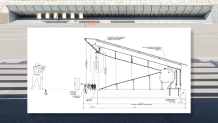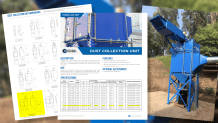Seven San Diego Police Department officers have filed worker's compensation claims after blood testing showed elevated lead levels in their bodies, and the Police Chief has shut down an outdoor gun range believed to be the cause.
No bullets have been fired at the range since May 17 and it could be another five months until it's reopened. Jared Wilson, the President of the San Diego Police Officers Association, is urging all members to get blood tests.
"I'm shocked," Wilson told NBC 7. "We just don't know how far it goes at this point. And it saddens me."
The range is located on Federal Boulevard, just north of state Route 94 and west of Interstate 805 in the Fairmount Park neighborhood. About a month ago, the city ordered air sample tests at the range after officers raised concerns. It's not unusual to find higher levels of lead at firing ranges, but those tests showed lead concentrations more than 10 times greater than the OSHA standard for acceptable air levels.
"The officers who work there have gray dust in their nose and ears at the end of the day from working there for 10 hours doing department shoots," Wilson said. "And they’ve been subjected to lead dust for over a year now."
A little more than a year ago, the city installed a Vortex Total Containment Trap as part of an ongoing renovation project. As bullets enter a chamber, they are funneled into a compartment that can be removed and emptied. Before that installation, bullets were fired through targets into dirt berms.

The city chose not to include an optional dust collection unit. That unit uses negative pressure to pull dust and toxins toward the back of the trap where it enters a filtering system.

Every year, sworn SDPD officers are required to pass firearm proficiency training at that range for their service weapons and off-duty weapons. That's a minimum of three sessions per gun.
The police union says the firearms instructors who work at the range now suffer from chronic headaches and joint pain, and that all seven officers recently tested for lead exposure and reported blood lead levels in the teens. NBC 7 Investigates asked to see those test results, but the officers declined to share their medical information.
Doctors say no level of lead in your blood is considered safe. Cal/OSHA requires that employers immediately remove workers who test at or above 50 micrograms of lead per deciliter of blood. The California Department of Public Health considers any level over five "dangerous."
"Lead is a known toxin to your brain," said Dr. Richard Clark, M.D., Director of Toxicology at UC San Diego Health. "It's a neurotoxin. And we know that the more lead you have in your body and the more you’re exposed to, the worse off it is."
Clark said higher lead levels or exposure over a long time can cause brain and kidney damage, and even kill you. It's also dangerous for pregnant women and can cause miscarriage, stillbirth and birth defects.
"It gets into the body really easily when you inhale it," Clark said. "You're breathing that in, and it gets in the lungs and in your body really well through that. It doesn't take a lot in the air for it to get into your body."
That's why lead dust is especially concerning at gun ranges. Yet, the city chose not to install that dust collection unit, a piece of safety equipment that would have added $184,000 to the city's $17.8 million range renovation project.
"It's disappointing," Wilson said. "It's penny-pinching to the point where we're hurting workers."
When we asked the city why the collector wasn’t installed, they said it's because it was optional. The manufacturer confirmed to NBC 7 Investigates some customers choose not to install them at outdoor ranges.
A public records request filed by NBC 7 shows a city employee pushing for the dust collection unit to be added to future phases of the project. In July of 2021, that employee wrote in part:
"As one of our violations was related to lead dust, incorporating these devices into the next phases would seem to be a priority. It is my understanding that including one of these devices was decided against during the last design phase. Having received violations in February of 2020, I am having a hard time understanding the logic in that decision."
"I can't believe the mismanagement that went into this," Wilson said. "I have a lot of concerns at this point and we have a lot of questions still."
Fixing lead issues at the range is a priority now. Mayor Todd Gloria's office didn’t make him available for an on-camera interview, but sent a statement:
"Mayor Gloria has an unwavering commitment to ensuring all city employees, including our police officers, have safe working conditions. The potential increased lead exposure stems from a new bullet retrieval system that was installed in 2020 and is due to rifle rounds (not pistol) that officers are required to demonstrate proficiency in under POST. Once the Police Chief became aware of this lead exposure, he made the determination to shut down the firing range in order to prevent any additional exposure. After learning about the situation, the Mayor immediately directed the purchase of a dust collector to help mitigate the lead particles into the air. The Mayor anticipates this dust collector to be installed, and the firing range operational, by October. In addition, it’'important to note the Mayor had already allocated $2.7 million worth of improvements to the Department’s firing range in this fiscal year's budget.”"
Since the range is now closed, the department is advising officers to use other police agencies or private ranges to practice.
NBC 7 Investigates discovered the range was cited for violations relating to lead prior to the renovation. That happened most recently during a routine inspection of the range in February of 2020, which is what that city worker was referencing in his email about the dust collection unit.
Five violations were discovered at that time, having to do with proper handling and disposal of hazardous waste.
- Violation 1: Failed to make a proper waste determination
- Violation 2: Failed to properly dispose of hazardous waste at an authorized facility.
- Violation 3: Failed to maintain &/or operate facility to minimize the possibility of a fire, explosion, or any unplanned sudden or non-sudden release of hazardous waste or hazardous waste constituents.
- Violation 4: Initial &/or annual employee training not conducted in safety procedures for a hazardous material release or threatened release &/or employee training records not available or not maintained for 3 years.
- Violation 5: Failed to report &/or update the required inventory information for hazardous waste(s) generated at the facility in CERS.

